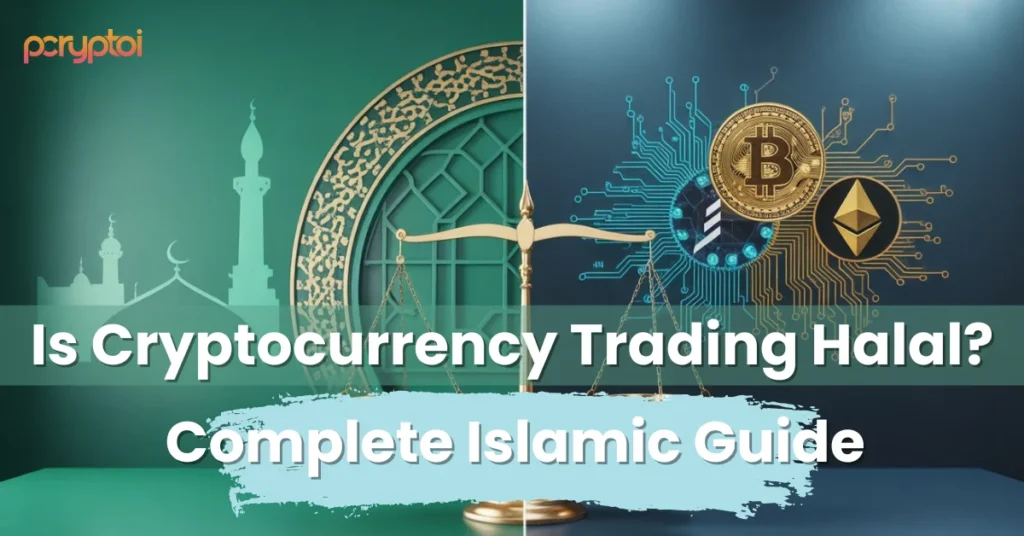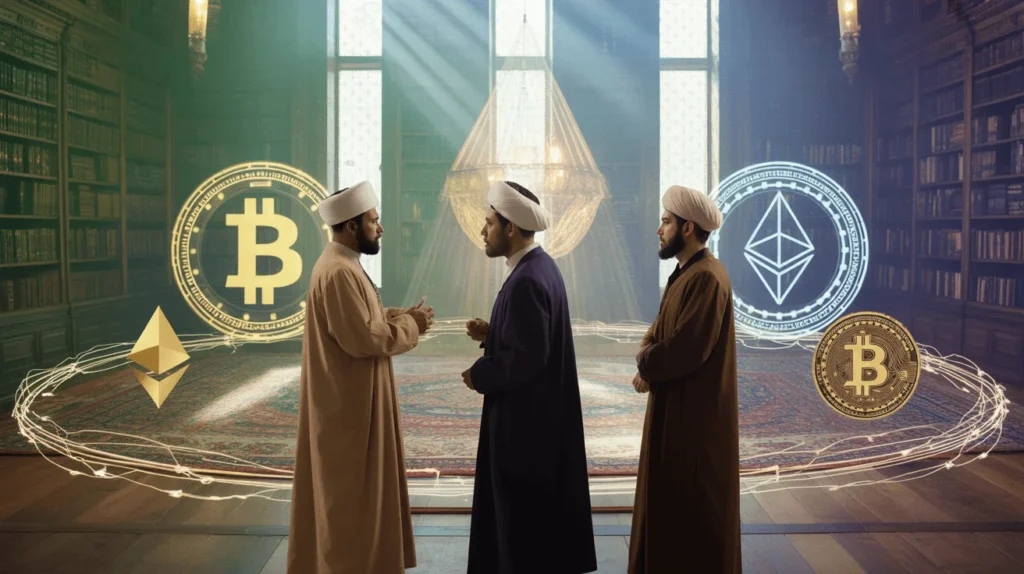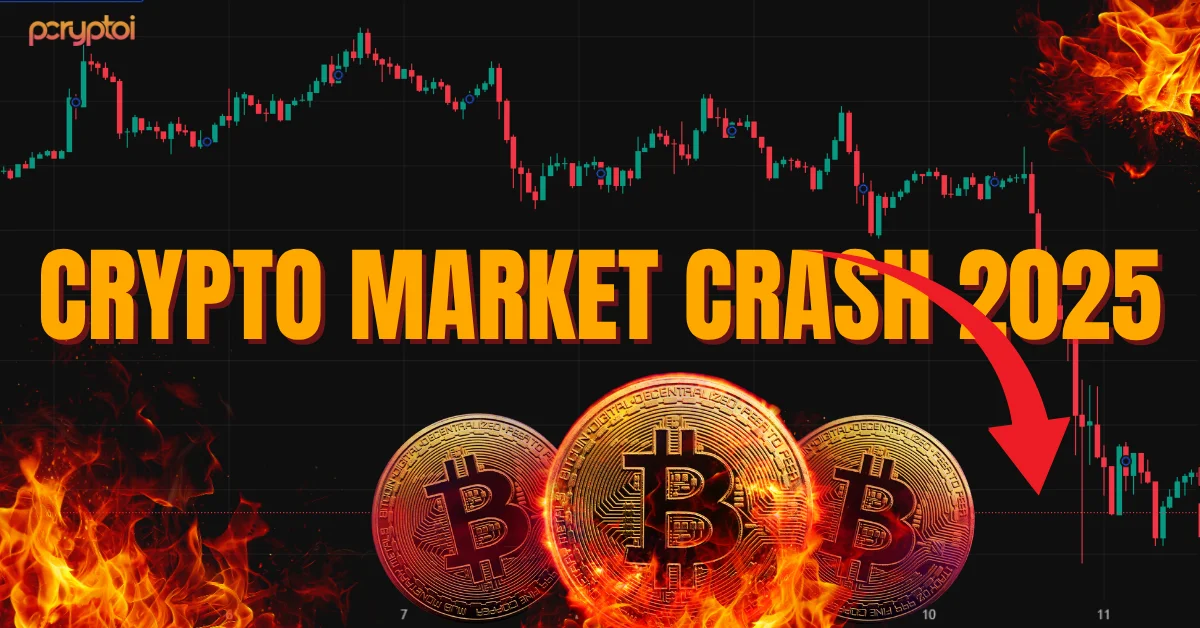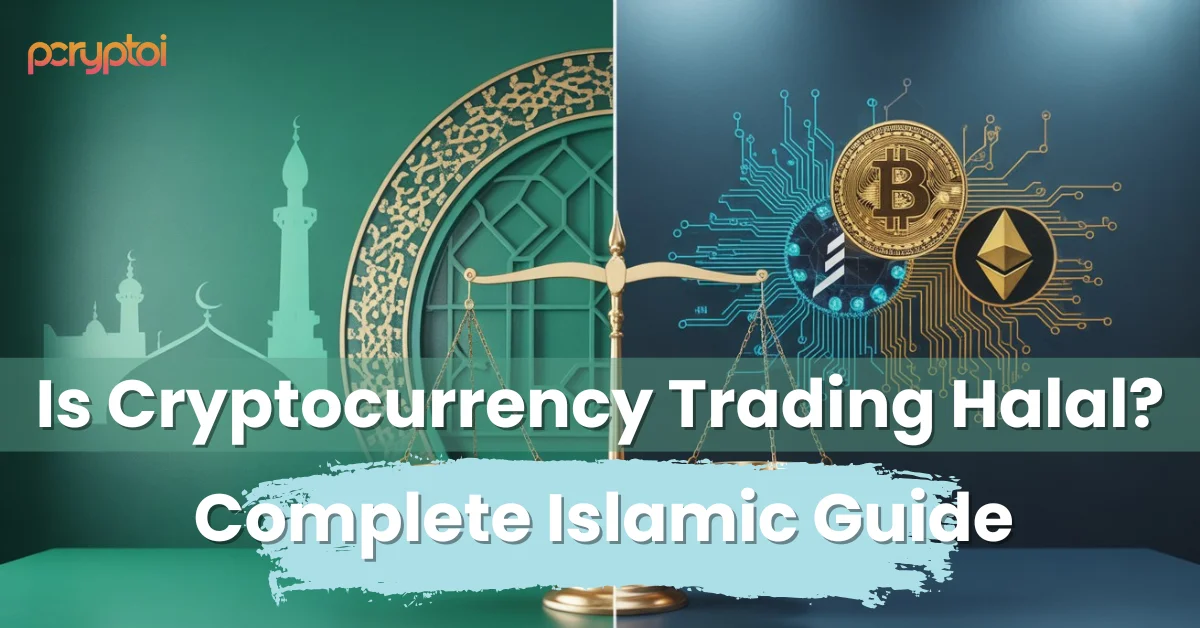
Is cryptocurrency trading halal? This is one of the questions that has elicited a major controversy among Muslims worldwide with the increased mainstream adoption of digital currencies. As Bitcoin, Ethereum, and thousands of additional cryptocurrencies take over the financial news, Muslim investors are starting to raise the question: is cryptocurrency halal in Islam, or is it something outlawed?
The crossroads between cryptocurrency and Islam are a challenge of their own to both scholars and ordinary Muslims. The debate on Islamic cryptocurrency and Sharia-compliant investing has never been so topical in Pakistan and other countries with a majority Muslim population. With the adoption of blockchain technology in the traditional financial systems, Muslims must be given a clear explanation of whether they should be part of this new digital revolution or not in relation to their Islamic belief.
This detailed guide examines the academic perspectives, practical applications, and complexities that shape the debate over whether crypto trading is halal. This article will guide you in finding your way through the complicated dilemma of whether the cryptocurrency trading halal or haram business, whether you are in Pakistan or not.
The Islamic word on Cryptocurrency.
The essence of the question is cryptocurrency is halal or haram, which lacks a universally accepted answer among Islamic scholars. The cryptocurrency and Islam debate highlights the more general issue of the application of centuries-old Islamic jurisprudence to financial innovations in the 21st century.
Diverse Scholarly Opinions
Islamic scholars have adopted different stances on the issue of whether crypto is haram or halal:
Permissive View: There are scholars who hold the opinion that cryptocurrencies are permissible because they are legitimate digital assets. They equate crypto with money, goods, or property that can be purchased, sold, and possessed. In this view, cryptocurrency can be halal provided that the transactions do not involve illegal things such as riba (interest), gharar (unreasonable uncertainty), and maiser (gambling).
Prohibitive View: Other researchers make cryptocurrencies haram based on speculation, absence of substance, extreme volatility, and involvement in illegal operations. They claim that crypto markets have too much gharar since they are uncertain; they are not permissible, despite the trading practices.
Cautious Middle Ground: A third category is a more nuanced one, which says that cryptocurrency is halal or haram depending on its application. They differentiate between a fair investment in blockchain technology and a gamble on the price dynamics.
Fatwas and Official Rulings
The religious leaders in Pakistan have given inconsistent advice. Pakistani scholarship has also raised issues regarding the volatility and speculative character of cryptocurrency, on the one hand, and, on the other, the potential it has when used sensibly. The State Bank of Pakistan has traditionally been reserved regarding crypto, yet the regulations are being changed.
International institutions such as Egypt’s Dar al-Ifta have issued fatwas denouncing cryptocurrency, and academics in Turkey, Indonesia, and the Gulf states have presented more relaxed interpretations. The Organization of Islamic Cooperation (OIC) has also requested further research, noting that it is necessary to have comprehensive Islamic guidance on digital assets.
The absence of consensus indicates the difficulty of applying the principles of Islamic finance to technology that did not exist during the creation of the conventional fiqh (Islamic jurisprudence). These are the different views that one would want to understand when posing a question such as is cryptocurrency halal in Islam.

Is Cryptocurrency Trading Halal or Haram?
The central question is whether cryptocurrency trading is halal; this is to be considered not only with what you trade but also how you trade it. The philosophies of Islamic finance promote the idea that how a transaction is carried out is important, rather than the asset itself.
Halal Trading Practices
Spot Trading: Spot trading (buying and selling of cryptocurrencies immediately) is considered to be generally the most Sharia-compliant method. You buy Bitcoin or Ethereum and plan to own the real thing; that is, you are actually exchanging value. This resembles traditional commodity trading, which is allowed in Islam.
Physical Possession: Having the actual possession of cryptocurrency in your wallet, as opposed to just gambling on price variations in speculation, is in accordance with Islamic teachings of actual ownership. This formulates the sale as a real deal and not a speculative position.
Long-term Investment: Cryptocurrencies as part of a diverse investment portfolio, as opposed to day-trading to make easy money, decreases the gambling/speculation aspect. This way will be more acceptable among those scholars who will allow the use of cryptocurrency under some conditions.
Haram Trading Practices
Leverage and Margin Trading: The idea of trading with money borrowed is to increase your trading with the help of riba (interest), which is forbidden in Islamic teachings. Most exchanges provide leverage of up to 10x, 50x, or even 100x, all of which come with interest-bearing loans and are categorically haram.
Futures and Derivatives: By buying or selling crypto futures and options, or other derivatives, you can make a bet on the future price without actually owning the underlying product. This causes too much gharar (uncertainties) and reminds more of gambling than any form of investment, and hence is problematic according to Islam.
Short Selling: Selling the borrowed cryptocurrency, hoping to repurchase it at a lower price, is a combination of riba and selling unowned goods, both of which are outlawed in Islamic finance.
Excessive Speculation: Day trading that is too fast and concentrated on price speculation, without any consideration of the value or utility of the cryptocurrency beneath, may be seen by most researchers as Maisir (gambling).
The solution to the question of is trading cryptocurrency halal or not requires serious consideration to avoid the haram practices. When Muslims raise the question of whether cryptocurrency trading halal or haram, they need to consider their trading practices, but not only their cryptocurrency selections.
Is Cryptocurrency Halal in Islam?
To answer the question about is cryptocurrency is halal in Islam, it is necessary to analyze the essence of digital currencies in terms of the principles of Islamic finance.
Islamic Finance Framework
Islamic finance forbids three key factors:
- Riba (Interest): Interest or predetermined profit on loans or interest-bearing instruments.
- Gharar (Too much Uncertainty): Dealings involving uncertain terms or results.
- Maisir (Gambling): Gambling, which is akin to a game.
To be halal, cryptocurrency should not violate all 3 prohibitions and should respond to the provisions of a legal Islamic deal.
Comparing Scholarly Perspectives
The “Yes, Cryptocurrency is Halal”
Camp Scholars who answer is crypto halal affirmatively point to several factors:
Cryptocurrencies are digital assets that have real-life use. An example, such as Bitcoin, can be utilized as a peer-to-peer transaction with no intermediaries, which may lead to cost reductions and a higher level of financial inclusion. Ethereum allows smart contracts, which may transform Sharia-compliant contracts.
According to these scholars, blockchain technology has the qualities of transparency and immutability, which coincide with the Islamic principles of honest dealing. The decentralization of cryptocurrency eliminates the traditional banking intermediaries that commonly make a profit through riba-based systems.
In this sense, is cryptocurrency halal in Islam? Yes, when so purchased and dealt in by lawful methods.
No, cryptocurrency is Haram Camp.
Scholars who answer is crypto haram highlight serious concerns:
The excess gharar is caused by the extreme volatility of cryptocurrencies. Lacking stability, Bitcoin can fluctuate 20 percent in one day, which is more speculation than currency or investment. These cryptocurrencies are vulnerable because they are not supported by either physical objects or the government itself.
Also, there are ethical issues associated with cryptocurrency and money laundering, ransomware, and other illicit transactions. The anonymous nature of many crypto transactions can facilitate haram activities.
These scholars argue that the uncertain, speculative nature of crypto markets makes them impermissible regardless of trading method.
The Conditional Approach
A growing number of scholars take a middle path: cryptocurrency is halal or haram depending on specific circumstances. They establish conditions under which crypto trading might be permissible:
- The cryptocurrency must have legitimate utility beyond speculation.
- Trading must involve actual ownership, not derivatives or futures.
- No leverage or interest-bearing loans should be used.
- The purpose should be investment or payment, not gambling.
- The specific cryptocurrency should not primarily facilitate haram activities.
This subtle opinion recognizes that there is no easy answering that is cryptocurrency halal in Islam, but it is best to consider the case on a case-by-case basis.
Trading of Cryptocurrencies in Pakistan (Islamic Backdrop)
The cryptocurrency trading in Pakistan has its unique importance because Pakistan is in the process of negotiating its Islamic identity and the modernization of its economy.
Regulatory Environment in Pakistan.
The attitude of Pakistan towards cryptocurrency has changed significantly in the past several years. The first warning issued by the State Bank of Pakistan (SBP) was in 2018, as the bank warned banks and other financial organizations against banking crypto transactions. This position was later contested by the Sindh High Court, as the court raised the question of whether SBP could prohibit cryptocurrency.
By 2025, Pakistan will be in the intermediate stage. Although no formal law exists to restrict the ownership of cryptocurrencies, but regulatory systems are developing by the government of Pakistan, and they also created the first Pakistan Crypto Council (PCC). This leaves the Pakistani Muslims with a question regarding the legality and Islamic permissibility of cryptocurrency trading in Pakistan.
Pakistani scholars and religious boards
The cryptocurrency has elicited mixed views among the Pakistani religious scholars. Cryptocurrency has been deliberated on by the Council of Islamic Ideology, which is a body of advisors to the Pakistani government, although it has not given a final verdict. The various scholars have held various positions depending on their understanding of Islamic finance principles.
The speculative aspect of crypto markets is something that some Pakistani ulema highlight to make it problematic in a Sharia sense. They make the comparison with gambling and tell Muslims that they should not engage in unstable crypto trading.
Other Pakistani researchers claim that blockchain technology in itself is allowed and that cryptocurrencies can be halal, provided they are traded responsibly. They distinguish investing in crypto as an investment or currency from having to speculate in a gamble.
Public Sentiment and Adoption
Cryptocurrency adoption in Pakistan has risen considerably, and Pakistan stands in 3rd position for crypto investment in the world, even though the regulation is ongoing. Cryptocurrency has garnered great interest in young Pakistani investors, especially technical ones. P2P exchanges have also developed to support crypto trading that is not involved in a financial institution.
The topic of cryptocurrency halal in Pakistan is indicative of wider conflicts between technology and religion. A significant number of Pakistani Muslims desire to join the global crypto economy but need to be assured that it is not against their religion.
The Pakistani crypto-lovers tend to think of advanced Islamic finance economies in Malaysia, the UAE, and Bahrain to guide them. The countries have gone further to establish Sharia-compliant cryptocurrency systems, and Pakistan can eventually adopt such models.

Islamic Cryptocurrency: Myth or Reality?
Islamic cryptocurrency has become a reality, whereby entrepreneurs and academics are trying to develop Sharia-approved alternatives to mainstream digital currency.
Is it an Islamic cryptocurrency?
When individuals are searching for Islamic cryptocurrency, what they are likely referring to are cryptocurrencies that are based on the principles of Islamic finance. The projects are designed to get rid of the banned items, such as riba, gharar, and maisir, without the technological drawbacks of blockchain.
Several initiatives have tried to produce Islamic cryptocurrencies:
OneGram: OneGram is a cryptocurrency launched in Dubai, and every token is backed by gold. The gold backing is designed to offer the intrinsic value and stability over the issue of cryptocurrencies having no tangible assets, raised by scholars. The transaction fees are used to purchase other gold, and a profit-sharing mode is established instead of interest.
HelloGold: It is a Malaysian platform that integrates blockchain technology with gold ownership, where one can purchase, sell, and store gold in a digitalized manner. Although it is not actually a cryptocurrency, it is an effort to combine Islamic financing with digital assets.
Islamic Coins Built on Stellar: There have been projects where various Stellar blockchain-based projects have developed Sharia-compliant tokens that can be used in Islamic financial transactions with a focus on transparency and adherence to Islamic ideals.
Is it possible that cryptocurrency can be Islamic?
The question remains: Is cryptocurrency halal or haram when specifically designed to be Islamic? This will be based on several factors:
Asset Backing: The potential solution to the inherent value issue is asset-backed cryptocurrencies, in which the currency is backed by a real asset such as gold, silver, or property. This puts them closer to conventional Islamic physical commodity investments.
Governance and Compliance: To be a genuinely Islamic cryptocurrency, a cryptocurrency must have continued Sharia oversight. Other Islamic crypto projects have Sharia advisory boards, which periodically audit operations to guarantee further adherence.
Transaction Structures: Islamic cryptocurrencies require no interest-based lending, speculative derivatives, or other illegal financial instruments. The smart contracts and protocols should be based on the principles of Islamic finance.
Practical Challenges: The Islamic cryptocurrencies are struggling with important challenges, despite their good intentions. They are hard to trade because of limited liquidity, low market capitalization, and limited exchange listing. Mainstream cryptocurrencies have volatility, which may still apply to Islamic alternatives, continuing the gharar issue.
The Islamic Cryptocurrency verdict.
Although the idea of Islamic cryptocurrency has a lot of promise, these projects are new. They are genuine efforts at trying to unite cryptocurrency and Islam, though scholars are still divided on whether they can overcome all Islamic finance conditions.
Purpose-built Islamic cryptocurrencies can also be a compromise for Muslims who seek to know is cryptocurrency halal. Nevertheless, due diligence dictates that not all projects that proclaim themselves as being Islamic are the projects that adhere to Sharia precepts. Before investing, it is vital to be verified by reputable Islamic finance authorities.
Conclusion
The answer to the question of is cryptocurrency trading halal does not have a yes-or-no answer. Islamic academicians are not unanimous; some allow using cryptocurrency in case of ethical trading by spot transactions and actual ownership, and others declare it haram due to over-speculation, volatility, and gharar.
To Muslims who must maneuver in this maze of complexity, several principles come out distinctly:
- Stay clear of leverage, futures, and interest-based trading; all these are haram.
- Invest long-term rather than day trading speculation.
- Find a real use of cryptocurrencies instead of pure speculation.
- Enhanced Islamic cryptocurrencies: There are purpose-made cryptocurrencies that cater to Sharia issues.
- Ask the learned scholars in the field of Islamic finance and blockchain technology.
The crossroads between cryptocurrency and Islam is a continuing debate as faster changes in technology proceed compared to the ability of traditional religious institutions to keep up. Cryptocurrency could always be halal or haram depending on the situation, the motive, and the style of interaction.
To the Muslims in Pakistan and the rest of the world, the most effective strategy is to do extensive research and consultation with reliable scholars and put Islamic principles ahead of profit. With the development of regulations and the creation of more complete frameworks by Islamic finance professionals, clarity on is trading cryptocurrency halal will likely improve.
The guide gives Muslims a reliable source of information about all things related to cryptocurrency and Islam. At the same time as the discussion occurs, informed Muslims will be able to make conscious choices that respect their religion as well as their financial purpose. And regardless of whether you decide that cryptocurrency trading is or is not permitted to you in particular, make certain that your conclusion is made in good faith and based on sound Islamic knowledge.
The article is educational and is based on a variety of academic opinions. It is not religious or financial advice. Before deciding on cryptocurrency investments, Muslims have to meet qualified Islamic scholars and financial advisors.
Summery
Is cryptocurrency trading halal? This comprehensive guide provides an in-depth examination of the complex relationship between cryptocurrency and the Muslim faith, exploring the question of whether crypto trading is Sharia-compliant.
There is still controversy among Islamic scholars as to whether cryptocurrency is halal or haram. Some recognize it as a valid digital asset when bought and sold in the spot market, where ownership is real, and some would denounce it as a result of speculation, volatility, and gharar (uncertainty). The discussion revolves around three Islamic prohibitions, namely riba, gharar, and maisir.
Halal trading practices involve spot trading, true ownership of assets, and long-term investment. Some of the practices incorporated in Haram include leverage, margin trading, futures, and over-speculation, which contain prohibited elements.
In Pakistan, the regulation of cryptocurrency is ambiguous, and religious figures are unsure about its use. An Islamic cryptocurrency, such as OneGram, backed by physical gold, aims to develop Sharia-compliant alternatives, but their effectiveness is questionable.
The article concludes that cryptocurrency trading is halal, where it relies on individual situations, mode of trading, and academic interpretation. Muslims must not engage in trading with interest; they must consult learned scholars and should put Islamic principles first before profit. The emergence of new technology continues to shape the definitive directions of cryptocurrency and Islam.
Table of Content
Table of Contents
ToggleAbout Company
pakcryptoinfo is a team of crypto enthusiasts, traders on a mission to simplify digital currency for everyone. We are dedicated to providing innovative solutions tailored to your needs. With a focus on quality and customer satisfaction, our team works tirelessly to ensure your experience with us is seamless and rewarding.
Most Recent Posts
- All Posts
- Crypto and Islam
- Crypto News
- Featured Personalities
- Pak Crypto News
- PakCryptoInfo Blogs
Top Crypto Coins

Bitcoin (BTC)

Ethereum (ETH)

XRP (XRP)
BNB (BNB)

Dogecoin (DOGE)

Cardano (ADA)

Bitcoin Cash (BCH)

Litecoin (LTC)

Sui (SUI)

Polkadot (DOT)

Solana (SOL)

Arbitrum (ARB)

Dash (DASH)
Follow on Social Media
Buy Crypto
If your are beginner and want to start your journey in crypto also want to get the basic guide we can help you to start your crypto journey in buying crypto and many more.
We can Help to Promote your Business
FAQs
Whether cryptocurrency is halal or not is determined by its acquisition and utilization. According to some scholars, spot trading at the real ownership and non-leverage might be allowed. Nonetheless, speculative trading, futures, and margin trading with interest are haram. Depending on the particular cryptocurrency, mode of trade, and the Islamic scholar you refer to, the response is different.
This question is disputed by Islamic scholars. Other people believe that cryptocurrency is halal when it is traded responsibly. Others introduce it as haram because of over speculation, unpredictability, and no inherent value. A third group adopts a conditional approach and allows cryptocurrency in certain conditions, which eliminate riba, gharar, and maisir. Islamic authorities have no common ground.
Cryptocurrency in Pakistan has a gray regulatory zone. The State Bank of Pakistan has been cautious, but it has not taken an outright ban. The Pakistani Islamic thinkers have divided views; some caution the speculative aspect of crypto, while others allow it on condition. The local scholars in Pakistan should inform Muslims about the changing regulations, and it is advisable to avoid crypto trading before consulting the local scholars.
Islamic cryptocurrencies are cryptocurrencies that are created to adhere to Sharia rules. OneGram (which is supported by the physical gold) and other initiatives to eliminate riba, gharar, and maisir are examples. These cryptocurrencies are typically asset-backed, have Sharia advisory boards, and are governed by Islamic finance structures. But their practical achievement and actual Sharia observance are a matter of scholarly discussion.





 Tether
Tether  USDC
USDC  Lido Staked Ether
Lido Staked Ether  TRON
TRON